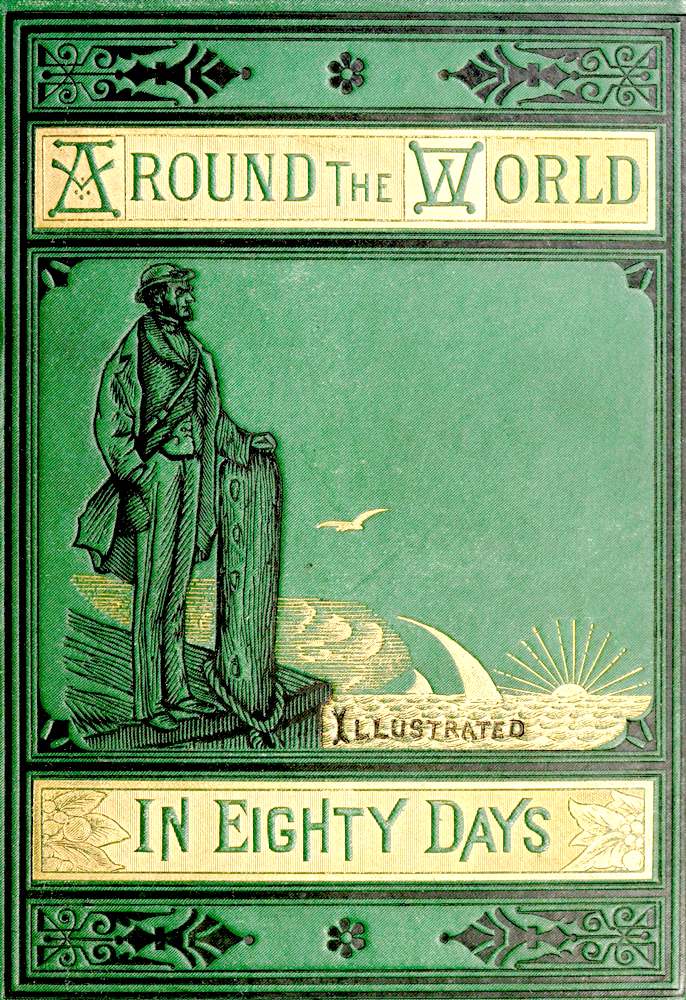|
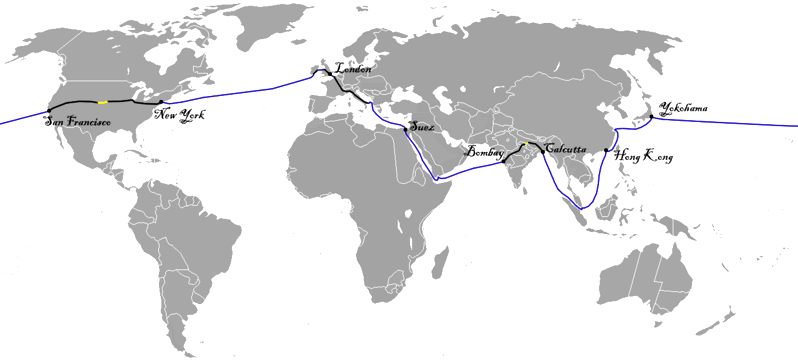
Map
of the route taken by Phileas Fogg, starting in London, then proceeding
east to Suez, Bombay, Calcutta, Hong Kong , Yokohama, San Francisco, New
York, and across the Atlantic
ocean to Ireland, then Liverpool England, and back to London. The route
planner below is for a circumnavigation on water in under 80 days, using
hydrogen, as per the author's prediction in The Mysterious Island. It
would be a major achievement if this was arranged to honor the 150th
anniversary of his publication.
<<<<
CHAPTER XX.
IN WHICH FIX COMES FACE TO FACE WITH PHILEAS FOGG
While these events were passing at the opium-house, Mr. Fogg, unconscious of the danger he was in of losing the steamer, was quietly escorting Aouda about the streets of the English quarter, making the necessary purchases for the long voyage before them. It was all very well for an Englishman like Mr. Fogg to make the tour of the world with a carpet-bag; a lady could not be expected to travel comfortably under such conditions. He acquitted his task with characteristic serenity, and invariably replied to the remonstrances of his fair companion, who was confused by his patience and generosity:
“It is in the interest of my journey—a part of my programme.”
The purchases made, they returned to the hotel, where they dined at a sumptuously served table-d’hôte; after which Aouda, shaking hands with her protector after the English fashion, retired to her room for rest. Mr. Fogg absorbed himself throughout the evening in the perusal of
the Times and Illustrated London News.
Had he been capable of being astonished at anything, it would have been not to see his servant return at bedtime. But, knowing that the steamer was not to leave for Yokohama until the next morning, he did not disturb himself about the matter. When
Passepartout did not appear the next morning to answer his master’s bell, Mr. Fogg, not betraying the least vexation, contented himself with taking his carpet-bag, calling Aouda, and sending for a palanquin.
It was then eight o’clock; at half-past nine, it being then high tide, the “Carnatic” would leave the harbour. Mr. Fogg and Aouda got into the palanquin, their luggage being brought after on a wheelbarrow, and half an hour later stepped upon the quay whence they were to embark. Mr. Fogg then learned that the “Carnatic” had sailed the evening before. He had expected to find not only the steamer, but his domestic, and was forced to give up both; but no sign of disappointment appeared on his face, and he merely remarked to Aouda, “It is an accident, madam; nothing more.”
At this moment a man who had been observing him attentively approached. It was Fix, who, bowing, addressed Mr. Fogg: “Were you not, like me, sir, a passenger by the ‘Rangoon,’ which arrived yesterday?”
“I was, sir,” replied Mr. Fogg coldly. “But I have not the honour—”
“Pardon me; I thought I should find your servant here.”
“Do you know where he is, sir?” asked Aouda anxiously.
“What!” responded Fix, feigning surprise. “Is he not with you?”
“No,” said Aouda. “He has not made his appearance since yesterday. Could he have gone on board the ‘Carnatic’ without us?”
“Without you, madam?” answered the detective. “Excuse me, did you intend to sail in the ‘Carnatic’?”
“Yes, sir.”
“So did I, madam, and I am excessively disappointed. The ‘Carnatic’, its repairs being completed, left Hong Kong twelve hours before the stated time, without any notice being given; and we must now wait a week for another steamer.”
As he said “a week” Fix felt his heart leap for joy. Fogg detained at Hong Kong for a week! There would be time for the warrant to arrive, and fortune at last favoured the representative of the law. His horror may be imagined when he heard Mr. Fogg say, in his placid voice, “But there are other vessels besides the ‘Carnatic,’ it seems to me, in the harbour of Hong Kong.”
And, offering his arm to Aouda, he directed his steps toward the docks in search of some craft about to start. Fix, stupefied, followed; it seemed as if he were attached to Mr. Fogg by an invisible thread. Chance, however, appeared really to have abandoned the man it had hitherto served so well. For three hours Phileas Fogg wandered about the docks, with the determination, if necessary, to charter a vessel to carry him to Yokohama; but he could only find vessels which were loading or unloading, and which could not therefore set sail. Fix began to hope again.
But Mr. Fogg, far from being discouraged, was continuing his search, resolved not to stop if he had to resort to Macao, when he was accosted by a sailor on one of the wharves.
“Is your honour looking for a boat?”
“Have you a boat ready to sail?”
“Yes, your honour; a pilot-boat—No. 43—the best in the harbour.”
“Does she go fast?”
“Between eight and nine knots the hour. Will you look at her?”
“Yes.”
“Your honour will be satisfied with her. Is it for a sea excursion?”
“No; for a voyage.”
“A voyage?”
“Yes, will you agree to take me to Yokohama?”
The sailor leaned on the railing, opened his eyes wide, and said, “Is your honour joking?”
“No. I have missed the ‘Carnatic,’ and I must get to Yokohama by the 14th at the latest, to take the boat for San Francisco.”
“I am sorry,” said the sailor; “but it is impossible.”
“I offer you a hundred pounds per day, and an additional reward of two hundred pounds if I reach Yokohama in time.”
“Are you in earnest?”
“Very much so.”
The pilot walked away a little distance, and gazed out to sea, evidently struggling between the anxiety to gain a large sum and the fear of venturing so far. Fix was in mortal suspense.
Mr. Fogg turned to Aouda and asked her, “You would not be afraid, would you, madam?”
“Not with you, Mr. Fogg,” was her answer.
The pilot now returned, shuffling his hat in his hands.
“Well, pilot?” said Mr. Fogg.
“Well, your honour,” replied he, “I could not risk myself, my men, or my little boat of scarcely twenty tons on so long a voyage at this time of year. Besides, we could not reach Yokohama in time, for it is sixteen hundred and sixty miles from Hong Kong.”
“Only sixteen hundred,” said Mr. Fogg.
“It’s the same thing.”
Fix breathed more freely.
“But,” added the pilot, “it might be arranged another way.”
Fix ceased to breathe at all.
“How?” asked Mr. Fogg.
“By going to Nagasaki, at the extreme south of Japan, or even to Shanghai, which is only eight hundred miles from here. In going to Shanghai we should not be forced to sail wide of the Chinese coast, which would be a great advantage, as the currents run northward, and would aid us.”
“Pilot,” said Mr. Fogg, “I must take the American steamer at Yokohama, and not at Shanghai or Nagasaki.”
“Why not?” returned the pilot. “The San Francisco steamer does not start from Yokohama. It puts in at Yokohama and Nagasaki, but it starts from Shanghai.”
“You are sure of that?”
“Perfectly.”
“And when does the boat leave Shanghai?”
“On the 11th, at seven in the evening. We have, therefore, four days before us, that is ninety-six hours; and in that time, if we had good luck and a south-west wind, and the sea was calm, we could make those eight hundred miles to Shanghai.”
“And you could go—”
“In an hour; as soon as provisions could be got aboard and the sails put up.”
“It is a bargain. Are you the master of the boat?”
“Yes; John Bunsby, master of the ‘Tankadere.’”
“Would you like some earnest-money?”
“If it would not put your honour out—”
“Here are two hundred pounds on account sir,” added Phileas
Fogg, turning to Fix, “if you would like to take advantage—”
“Thanks, sir; I was about to ask the favour.”
“Very well. In half an hour we shall go on board.”
“But poor Passepartout?” urged Aouda, who was much disturbed by the servant’s disappearance.
“I shall do all I can to find him,” replied Phileas Fogg.
While Fix, in a feverish, nervous state, repaired to the pilot-boat, the others directed their course to the police-station at Hong Kong. Phileas Fogg there gave Passepartout’s description, and left a sum of money to be spent in the search for him. The same formalities having been gone through at the French consulate, and the palanquin having stopped at the hotel for the luggage, which had been sent back there, they returned to the wharf.
It was now three o’clock; and pilot-boat No. 43, with its crew on board, and its provisions stored away, was ready for departure.
The “Tankadere” was a neat little craft of twenty tons, as gracefully built as if she were a racing yacht. Her shining copper sheathing, her galvanised iron-work, her deck, white as ivory, betrayed the pride taken by John Bunsby in making her presentable. Her two masts leaned a trifle backward; she carried brigantine, foresail, storm-jib, and standing-jib, and was well rigged for running before the wind; and she seemed capable of brisk speed, which, indeed, she had already proved by gaining several prizes in pilot-boat races. The crew of the “Tankadere” was composed of John Bunsby, the master, and four hardy mariners, who were familiar with the Chinese seas. John Bunsby, himself, a man of forty-five or thereabouts, vigorous, sunburnt, with a sprightly expression of the eye, and energetic and self-reliant countenance, would have inspired confidence in the most timid.
Phileas Fogg and Aouda went on board, where they found Fix already installed. Below deck was a square cabin, of which the walls bulged out in the form of cots, above a circular divan; in the centre was a table provided with a swinging lamp. The accommodation was confined, but neat.
“I am sorry to have nothing better to offer you,” said Mr. Fogg to Fix, who bowed without responding.
The detective had a feeling akin to humiliation in profiting by the kindness of Mr. Fogg.
“It’s certain,” thought he, “though rascal as he is, he is a polite one!”
The sails and the English flag were hoisted at ten minutes past three. Mr. Fogg and
Aouda, who were seated on deck, cast a last glance at the quay, in the hope of espying Passepartout. Fix was not without his fears lest chance should direct the steps of the unfortunate servant, whom he had so badly treated, in this direction; in which case an explanation the reverse of satisfactory to the detective must have ensued. But the Frenchman did not appear, and, without doubt, was still lying under the stupefying influence of the opium.
John Bunsby, master, at length gave the order to start, and the “Tankadere,” taking the wind under her brigantine, foresail, and standing-jib, bounded briskly forward over the waves.
NEXT
>>>>
CHAPTERS
1. - I. IN WHICH PHILEAS FOGG AND PASSEPARTOUT ACCEPT EACH OTHER, THE ONE AS
MASTER AND AS MAN
2. - II. IN WHICH PASSEPARTOUT IS CONVINCED THAT HE HAS AT LAST FOUND HIS IDEAL
3. - III. IN WHICH A CONVERSATION TAKES PLACE WHICH SEEMS LIKELY TO COST PHILEAS FOGG DEAR
4. - IV. IN WHICH PHILEAS FOGG ASTOUNDS
PASSEPARTOUT, HIS SERVANT
5. - V. IN WHICH A NEW SPECIES OF FUNDS, UNKNOWN TO THE MONEYED MEN, APPEARS ON ’CHANGE
6. - VI. IN WHICH FIX, THE DETECTIVE, BETRAYS A VERY NATURAL IMPATIENCE
7. - VII. WHICH ONCE MORE DEMONSTRATES THE USELESSNESS OF PASSPORTS AS AIDS TO DETECTIVES
8. - VIII. IN WHICH PASSEPARTOUT TALKS RATHER MORE, PERHAPS, THAN IS PRUDENT
9. - IX. IN WHICH THE RED SEA AND THE INDIAN OCEAN PROVE PROPITIOUS TO THE DESIGNS OF PHILEAS FOGG
10. - X. IN WHICH PASSEPARTOUT IS ONLY TOO GLAD TO GET OFF WITH THE LOSS OF HIS SHOES
11. - XI. IN WHICH PHILEAS FOGG SECURES A CURIOUS MEANS OF CONVEYANCE AT A FABULOUS PRICE
12. - XII. IN WHICH PHILEAS FOGG AND HIS COMPANIONS VENTURE ACROSS THE INDIAN FORESTS, AND WHAT ENSUED
13. - XIII. IN WHICH PASSEPARTOUT RECEIVES A NEW PROOF THAT FORTUNE FAVORS THE BRAVE
14. - XIV. FOGG DESCENDS THE LENGTH OF THE BEAUTIFUL VALLEY OF THE GANGES WITHOUT EVER THINKING OF SEEING IT
15. - XV. IN WHICH THE BAG OF BANKNOTES DISGORGES SOME THOUSANDS OF POUNDS MORE
16. - XVI. IN WHICH FIX DOES NOT SEEM TO UNDERSTAND IN THE LEAST WHAT IS SAID TO HIM
17. - XVII. SHOWING WHAT HAPPENED ON THE VOYAGE FROM SINGAPORE TO HONG KONG
18. - XVIII. IN WHICH PHILEAS FOGG, PASSEPARTOUT, AND FIX GO EACH ABOUT HIS BUSINESS
19. - XIX. IN WHICH PASSEPARTOUT TAKES A TOO GREAT INTEREST IN HIS MASTER, AND WHAT COMES OF IT
20. - XX. IN WHICH FIX COMES FACE TO FACE WITH PHILEAS FOGG
21. - XXI. IN WHICH THE MASTER OF THE “TANKADERE” RUNS GREAT RISK OF LOSING A REWARD OF TWO HUNDRED POUNDS
22. - XXII. PASSEPARTOUT DISCOVERS IT IS CONVENIENT TO HAVE MONEY IN ONE’S POCKET
AT THE ANTIPODES
23. - XXIII. IN WHICH PASSEPARTOUT’S NOSE BECOMES OUTRAGEOUSLY LONG
24. - XXIV. DURING WHICH MR. FOGG AND PARTY CROSS THE PACIFIC OCEAN
25. - XXV. IN WHICH A SLIGHT GLIMPSE IS HAD OF SAN FRANCISCO
26. - XXVI. IN WHICH PHILEAS FOGG AND PARTY TRAVEL BY THE PACIFIC RAILROAD
27. - XXVII. IN WHICH PASSEPARTOUT UNDERGOES, AT A SPEED OF 20 MPH, A COURSE OF MORMON HISTORY
28. - XXVIII. IN WHICH PASSEPARTOUT DOES NOT SUCCEED IN MAKING ANYBODY LISTEN TO REASON
29. - XXIX. IN WHICH CERTAIN INCIDENTS ARE NARRATED WHICH ARE ONLY TO BE MET WITH ON AMERICAN RAILROADS
30. - XXX. IN WHICH PHILEAS FOGG SIMPLY DOES HIS DUTY
31. - XXXI. IN WHICH FIX, THE DETECTIVE, CONSIDERABLY FURTHERS THE INTERESTS OF PHILEAS FOGG
32. - XXXII. IN WHICH PHILEAS FOGG ENGAGES IN A DIRECT STRUGGLE WITH BAD FORTUNE
33. - XXXIII. IN WHICH PHILEAS FOGG SHOWS HIMSELF EQUAL TO THE OCCASION
34. - XXXIV. IN WHICH PHILEAS FOGG AT LAST REACHES LONDON
35. - XXXV. IN WHICH PHILEAS FOGG DOES NOT HAVE TO REPEAT HIS ORDERS TO PASSEPARTOUT TWICE
36. - XXXVI. IN WHICH PHILEAS FOGG’S NAME IS ONCE MORE AT A PREMIUM ON ’CHANGE
37. - XXXVII. PHILEAS FOGG FINDS HE GAINED NOTHING BY HIS TOUR AROUND THE WORLD, UNLESS IT WERE HAPPINESS
PLOT
- AROUND
THE WORLD IN EIGHTY DAYS
The story starts in London on October 2, 1872. Phileas Fogg is a wealthy, solitary, unmarried gentleman with regular habits. The source of his wealth is not known and he lives modestly. He fires his former valet, James Forster, for bringing him shaving
water two degrees too cold. He hires as a replacement
Passepartout, a Frenchman of around 30 years of age.
Later that day in the Reform Club, he gets involved in an argument over an article in
The Daily
Telegraph, stating that with the opening of a new railway section in India, it is now possible to travel around the world in 80 days.
Fogg accepts a wager for £20,000 from his fellow club members, which he will receive if he makes it around the world in 80 days. Accompanied by his manservant
Passepartout, he leaves London by train at 8.45 p.m. on October 2, 1872, and thus is due back at the Reform Club at the same time 80 days later, on December 21.
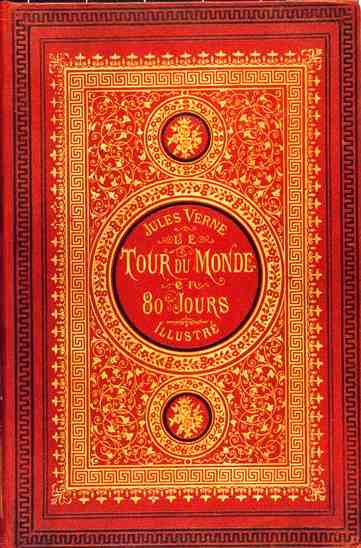
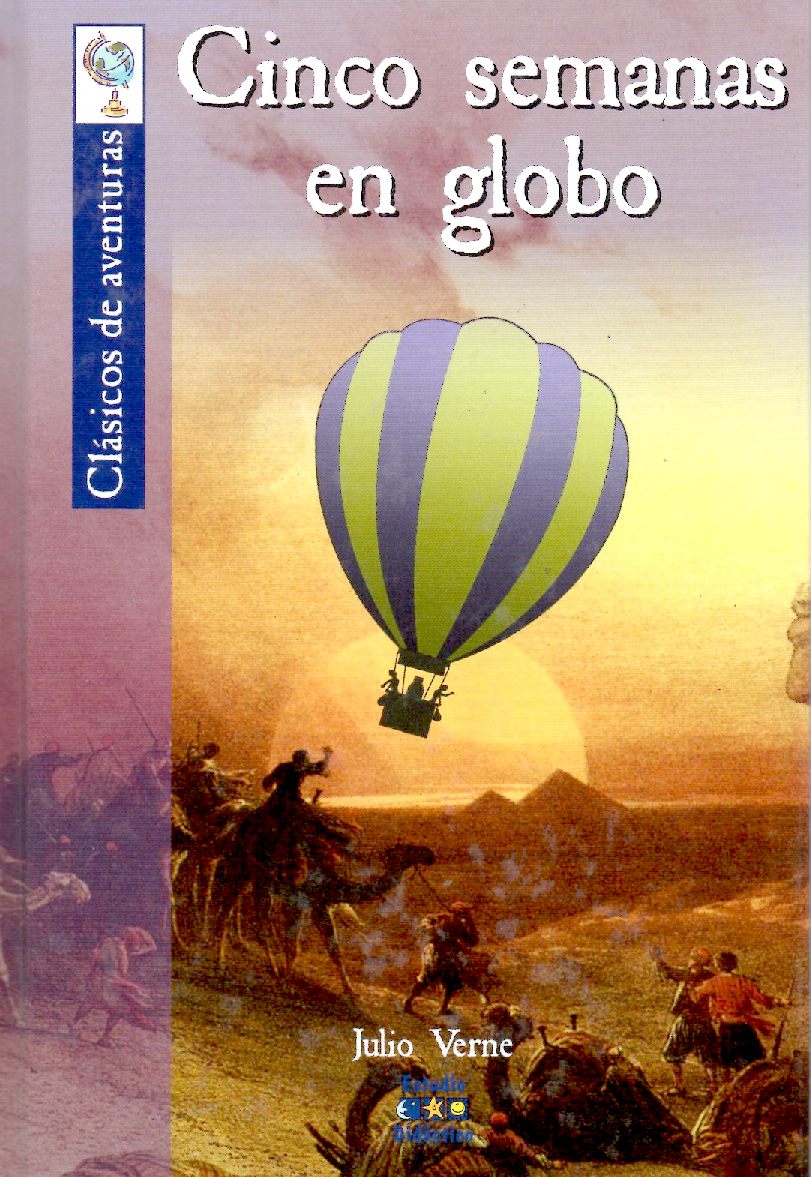
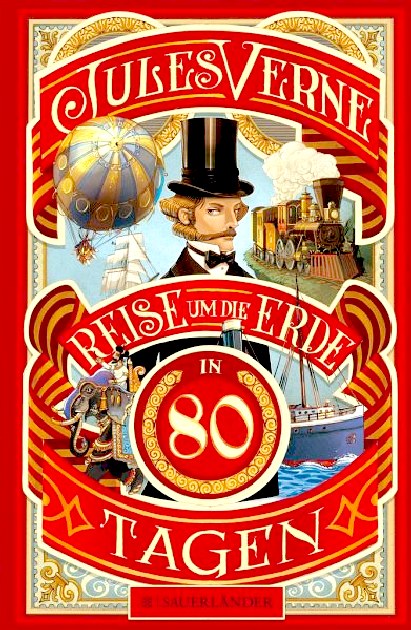
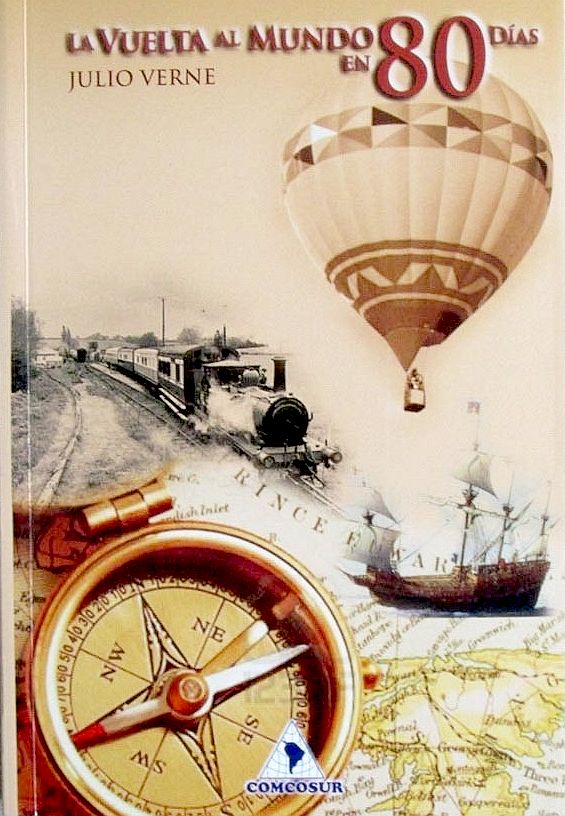
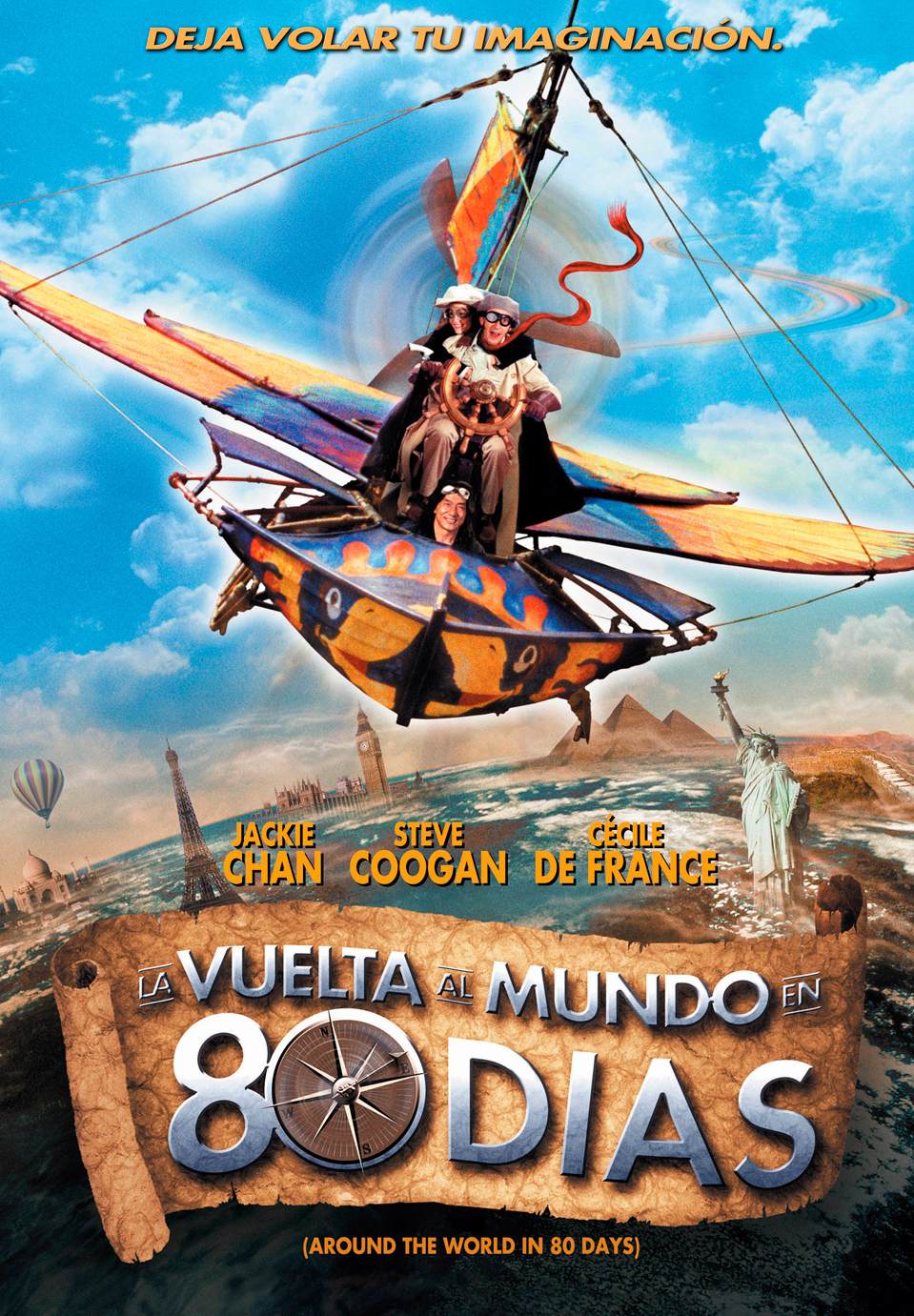
Many
of his stories today seem a little tame, as technology has caught up
with the imagination of the extraordinary French author, and Hollywood
has discovered Computer Generated Images (CGI) allowing super heroes to
grace our screens as never before. Computers are one thing that Verne
did not imagine or seek to portray.
Beginning in late 1872, the serialized version of Verne's famed Around the World in Eighty Days (Le Tour du monde en quatre-vingts jours) first appeared in print. The story of Phileas Fogg and Jean Passepartout takes readers on an adventurous global tour at a time when travel was becoming easier and alluring. In the century plus since its original debut, the work has been adapted for the theater, radio, television and film, including the classic 1956 version starring David
Niven. The TV series starring Pierce Brosnan released in 1989, runs for around 6 hours on
2 DVDs. A BBC
TV travel documentary starring Michael Palin, was also screened in
1989. A second TV series starring David Tennant was produced by the
BBC for 2021.
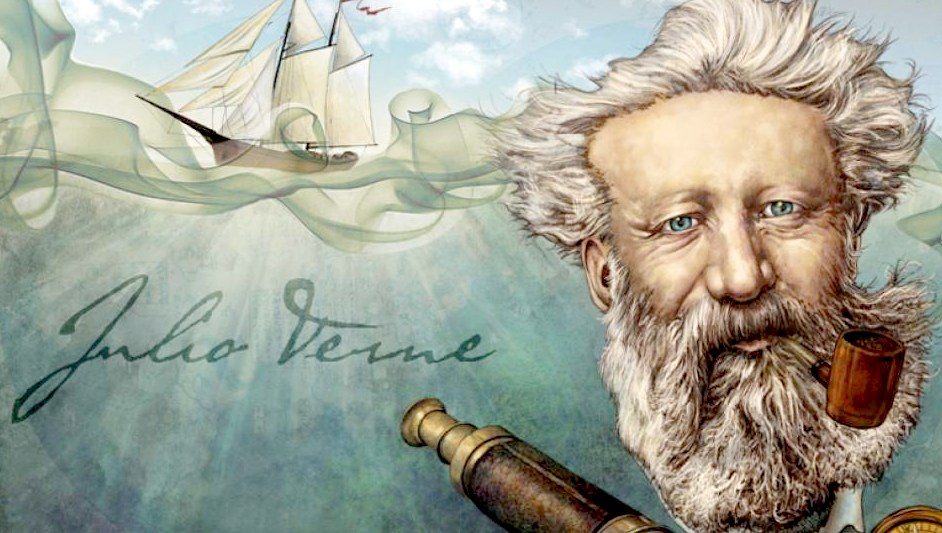
Jules
Verne is known as the Father of Science Fiction
Where
Jules Verne's suggested that it might be possible to travel Around The
World In 80 Days, we would like to extend that ethos to include
traveling in a Zero
Emission yacht (ZEWT or ZEV) driven by electric
hydro-jets? With the advent of solar power and liquid
hydrogen, it is a distinct possibility - on a scale of the wager
that the legendary Philleas Fogg entered into at the Reform Club in
1872.
|







